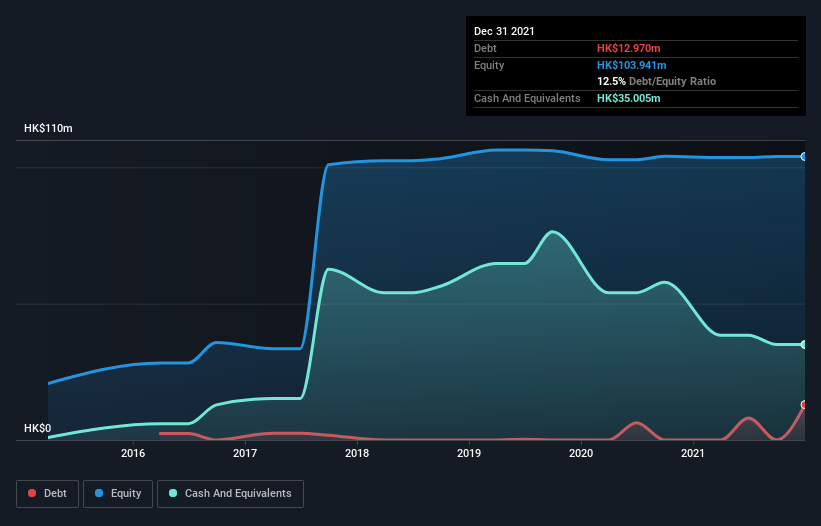- Hong Kong
- /
- Food and Staples Retail
- /
- SEHK:8413
Is Asia Grocery Distribution (HKG:8413) A Risky Investment?
The external fund manager backed by Berkshire Hathaway's Charlie Munger, Li Lu, makes no bones about it when he says 'The biggest investment risk is not the volatility of prices, but whether you will suffer a permanent loss of capital.' When we think about how risky a company is, we always like to look at its use of debt, since debt overload can lead to ruin. We note that Asia Grocery Distribution Limited (HKG:8413) does have debt on its balance sheet. But the more important question is: how much risk is that debt creating?
When Is Debt Dangerous?
Generally speaking, debt only becomes a real problem when a company can't easily pay it off, either by raising capital or with its own cash flow. If things get really bad, the lenders can take control of the business. However, a more common (but still painful) scenario is that it has to raise new equity capital at a low price, thus permanently diluting shareholders. Of course, debt can be an important tool in businesses, particularly capital heavy businesses. When we examine debt levels, we first consider both cash and debt levels, together.
See our latest analysis for Asia Grocery Distribution
What Is Asia Grocery Distribution's Debt?
You can click the graphic below for the historical numbers, but it shows that as of September 2021 Asia Grocery Distribution had HK$13.0m of debt, an increase on none, over one year. But it also has HK$35.0m in cash to offset that, meaning it has HK$22.0m net cash.

How Strong Is Asia Grocery Distribution's Balance Sheet?
The latest balance sheet data shows that Asia Grocery Distribution had liabilities of HK$20.4m due within a year, and liabilities of HK$7.81m falling due after that. On the other hand, it had cash of HK$35.0m and HK$38.5m worth of receivables due within a year. So it actually has HK$45.3m more liquid assets than total liabilities.
This excess liquidity suggests that Asia Grocery Distribution is taking a careful approach to debt. Because it has plenty of assets, it is unlikely to have trouble with its lenders. Simply put, the fact that Asia Grocery Distribution has more cash than debt is arguably a good indication that it can manage its debt safely. There's no doubt that we learn most about debt from the balance sheet. But it is Asia Grocery Distribution's earnings that will influence how the balance sheet holds up in the future. So if you're keen to discover more about its earnings, it might be worth checking out this graph of its long term earnings trend.
In the last year Asia Grocery Distribution wasn't profitable at an EBIT level, but managed to grow its revenue by 3.9%, to HK$241m. That rate of growth is a bit slow for our taste, but it takes all types to make a world.
So How Risky Is Asia Grocery Distribution?
We have no doubt that loss making companies are, in general, riskier than profitable ones. And the fact is that over the last twelve months Asia Grocery Distribution lost money at the earnings before interest and tax (EBIT) line. Indeed, in that time it burnt through HK$18m of cash and made a loss of HK$17m. With only HK$22.0m on the balance sheet, it would appear that its going to need to raise capital again soon. Overall, its balance sheet doesn't seem overly risky, at the moment, but we're always cautious until we see the positive free cash flow. The balance sheet is clearly the area to focus on when you are analysing debt. However, not all investment risk resides within the balance sheet - far from it. For example, we've discovered 2 warning signs for Asia Grocery Distribution (1 is a bit unpleasant!) that you should be aware of before investing here.
If, after all that, you're more interested in a fast growing company with a rock-solid balance sheet, then check out our list of net cash growth stocks without delay.
New: Manage All Your Stock Portfolios in One Place
We've created the ultimate portfolio companion for stock investors, and it's free.
• Connect an unlimited number of Portfolios and see your total in one currency
• Be alerted to new Warning Signs or Risks via email or mobile
• Track the Fair Value of your stocks
Have feedback on this article? Concerned about the content? Get in touch with us directly. Alternatively, email editorial-team (at) simplywallst.com.
This article by Simply Wall St is general in nature. We provide commentary based on historical data and analyst forecasts only using an unbiased methodology and our articles are not intended to be financial advice. It does not constitute a recommendation to buy or sell any stock, and does not take account of your objectives, or your financial situation. We aim to bring you long-term focused analysis driven by fundamental data. Note that our analysis may not factor in the latest price-sensitive company announcements or qualitative material. Simply Wall St has no position in any stocks mentioned.
About SEHK:8413
Asia Grocery Distribution
An investment holding company, trades in and distributes food and beverage grocery products under Hung Fat Ho brand name in Hong Kong.
Flawless balance sheet and fair value.
Market Insights
Community Narratives


Recently Updated Narratives


MINISO's fair value is projected at 26.69 with an anticipated PE ratio shift of 20x


The Quiet Giant That Became AI’s Power Grid


Nova Ljubljanska Banka d.d will expect a 11.2% revenue boost driving future growth
Popular Narratives


The company that turned a verb into a global necessity and basically runs the modern internet, digital ads, smartphones, maps, and AI.


MicroVision will explode future revenue by 380.37% with a vision towards success



